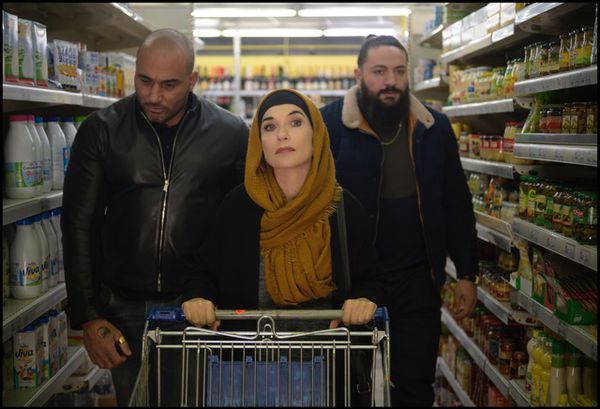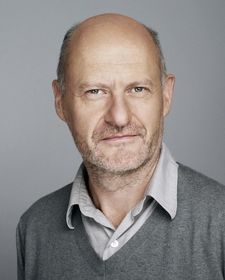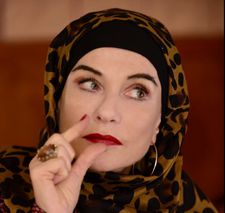 |
| Jean-Paul Salomé: 'I really liked that and also the tone of the comedy which was fun but also criticised certain aspects of society' Photo: Unifrance |
What were the elements of Hannelore Cayre’s best-selling novel that persuaded you to make a film of it?
Jean-Paul Salomé: When I read her novel I liked the subject but I also liked the tone of it. And she was relating things about the world of drugs that seemed to me to be authentic and real. It was well written and researched. I learned also that she had been a criminal advocate so everything she told in the book had the air of authenticity based on personal experience. The story wasn’t based on real events, but the background was real. I really liked that and also the tone of the comedy which was fun but also criticised certain aspects of society. Immediately also I felt there was role for Isabelle Huppert with whom I had wanted to work for some time. So it was an opportunity to work with her and with a role that seemed tailor made for her talents.
 |
| Jean-Paul Salomé: 'I’m fortunate because the film did come out and found its audience and was well received by the critics' Photo: Unifrance |
JPS: I wrote the script with the author Hannelore Cayre because it was how she wanted it to work. She didn’t want someone taking the rights of the book and leaving her out. She want to follow the process, and I didn’t mind that at all. We had never worked together before but ultimately it worked out well. In fact it was quite funny because it was of her insistence that we put distance between the film and the book. I was the one who wanted to keep things that were in the book that would work in the film rather than her. She had finished writing the book relatively recently and did not want to repeat herself and was keen for it go off in other directions. In the book there was almost a quarter of it at the beginning talk about the character’s past life but if we had done that in the film adaptation via flashbacks and going in to her childhood and so on it would have last more than three hours. That was the biggest change from the novel. After that it was mainly dealing with the different characters and making some of them more prominent. The police chief played by Hippolyte Girardot was less important in the book but we built him up in the film.
How did Isabelle Huppert get involved ?
JPS: I called her when she was on holiday, apologised for disturbing her and floated the idea that I had a role for her. I wanted to know her take on it before I got the rights to the book which was in great demand. She asked what the book was and I explained it was La Daronne. She said it was an incredible coincidence because she had just listened to the author on the radio and had rushed out to buy the book - and she had just finished reading it. She loved it and thought there was something we could do with it together and that I had absolutely to buy the rights. The role was written obviously with her in mind and that was first time in my career that I had written something specifically for a particular actor. And she was closely connected even at the writing stage. She read several different versions as the script developed and she gave her point of view on the character and how she was evolving.
Isabelle Huppert has a reputation for dramatic roles but in this film there is a balance between the comic and the serious. Was that an attraction for her?
JPS: I had met Isabelle on many occasions at film events at home and abroad and I found her much more lively and joyful than perhaps the public image of her. She has a great curiosity and is involved in lots of things besides cinema. It was a long time since I had seen her in a film and I said that it would great if we could do a comedy together. She responded that she would love to do something with a light touch because she wasn’t offered that many comedies.
How did she manage to become so fluent in Arabic?
 |
| Jean-Paul Salomé: 'I had met Isabelle on many occasions at film events at home and abroad and I found her much more lively and joyful than perhaps the public image of her' Photo: Unifrance |
The film takes place in the area of Paris called Ménilmontant - and by chance that’s where you now live. Did you begin to discover the area through shooting the film?
JPS: It was funny - here I was reading the book of La Daronne just before I moved in to the area and I discovered the story was all taking place around me. So, yes, I began to discover the area through making the film. I had lived in another part of Paris for around 25 years and didn’t know much about Ménilmontant. I found all the set pieces close by … and when I opened the front door in the morning there was Isabelle’s trailer where she was in the middle of being made up. At the end of day people were able to come and have a drink at the house. The retirement home you see in the film is in the street just behind me. I think also it helped me to give an authentic portrait of the area which is very polyglot.
How has the epidemic impacted on your work?
JPS: There are certainly frustrations. At the time of the first lockdown the film was due to come out on 25 March but my producer, just ten days before, said that we could not bring out the film then because it was too dangerous. At that point the cinemas were still open but the producer looked at what was happening Italy and knew France would be affected to the same degree in ten days. We cancelled the release. It was tough and on top of that I got and recovered from Covid. Anyway, the film was postponed until September and fortunately it did come out in September because look where we are now - locked in again. The film did well on release in France and it came out four weeks ago in Germany and Austria where they’ve just shut their cinemas again. I’m fortunate because the film did come out and found its audience and was well received by the critics. So I count my blessings that in the middle of a chaotic situation the film came out. A lockdown is depressing but despite that I have been writing and I have finished a new script. At least I have been able to use the time productively.





















